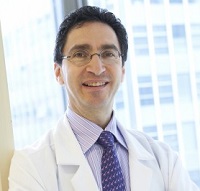 |
| Oncologist Leonard Saltz |
Pharma types are getting a wee bit defensive about critics' attacks on cancer drug prices, if response to FiercePharma's recent coverage is any indication. But the criticism just keeps on coming, even as drugmakers work with payers behind the scenes on mutually acceptable pricing deals.
At the big American Society for Clinical Oncology meeting over the weekend, a prominent speaker targeted the sticker prices on newly approved cancer meds. As The Wall Street Journal reports, Memorial Sloan Kettering Cancer Center oncologist Leonard Saltz put it bluntly: "These drugs cost too much."
Saltz mainly focused on Bristol-Myers Squibb's ($BMY) melanoma treatments, the WSJ notes, but he also went after cancer pricing in general, citing some stats showing the huge increase in monthly treatment costs, comparing 2000 to 2004 prices ($4,716 in inflation-adjusted dollars) with 2010 through 2014 ($9,900).
What's worse, Saltz said, was that the price increases don't necessarily correspond with increases in drugs' effectiveness. "Cancer-drug prices are not related to the value of the drug," Saltz said (as quoted by the newspaper) "Prices are based on what has come before and what the seller believes the market will bear."
To anyone who's been following the cancer-pricing controversy, these aren't new assertions. But they come from a prominent source at one of the most prominent cancer centers in the country--and at what might be the most high-profile medical meeting of the year, in cancer or otherwise.
Now, Saltz wasn't saying that many of the pricey new meds aren't major breakthroughs. Even in criticizing the pricing on BMS' Opdivo and Yervoy, he acknowledged that the combo delivered "truly, truly remarkable benefits" in a disease that was considered all but untreatable 5 years ago. But their combined cost--$295,000, he estimated, based on sticker prices--isn't sustainable.
Defending the industry, pharma advocates point out that drug spending in general had been fairly steady over the past several years, even dropping slightly in 2012, for the first time in 58 years. Growth has picked up since, of course--partly fueled by cancer drugs, but also by new-and-costly hepatitis C treatments--but industry experts say the benefits of these treatments are worth the additional costs. In hep C, for instance, curing patients saves money down the road on much more costly medical interventions such as liver transplants.
Plus, with biosimilar therapies coming down the pike, cancer drug makers face cheaper competition for some of the meds that have been reliable blockbusters for years. That will save the system money--pharmacy benefits manager Express Scripts ($ESRX), one of the biggest pricing critics, expects $250 billion in savings over 10 years. But it will also take its toll on drugmakers. Roche's ($RHHBY) Rituxan, for example, could face biosimilar competition sooner rather than later, putting a crimp on that drug's cash flow. It's depending on a follow-up med Gazyva to help fill that gap, but there's no guarantee that the new med will generate the uptake Roche hopes.
Meanwhile, some drugmakers say they're working with payers on cancer drug pricing that's pegged to results in individual indications. And Bloomberg reports that one of payers' biggest fears--pricey PCSK9 meds--are turning out to be an opportunity for PBMs and pharma to work together on cost deals.
More of that needs to happen in cancer Saltz told the Journal, and shying away from the subject won't serve anyone--particularly not patients, who are supposed to be everyone's focus. "All of the stakeholders involved need to stop pretending that price is something we don't need to discuss," Saltz said, "because it affects all of us, and it's affecting our ability to deliver quality care to everyone."
- read the WSJ story
- get more from Bloomberg
Special Report: The top 10 best-selling cancer drugs of 2013